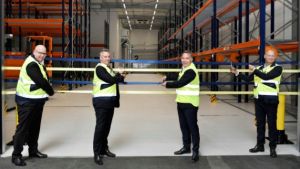Archives
Air, Feature, Freight News
Ready for the vaccine rush
[ August 20, 2020 // Chris ]Lufthansa Cargo says its worldwide storage capacity for temperature-sensitive freight is being massively expanded after opening its Pharma Hub Munich, after only five months’ construction.
It offers space for up to 96 pallets and loose cargo in two different temperature ranges (+2 to +8 °C and +15 to +25 °C) and a freezer (down to -18 °C) on almost 1,000sq m.
CEIV Pharma-certification by the International Air Transport Association is planned for the autumn, the first at Munich Airport, demonstrating that the facility meets strict criteria for the proper handling and storage of pharmaceutical shipments.
Lufthansa Cargo board member for operations, Harald Gloy, explained that the corona pandemic had made stable supply chains and fast transport of medicines or vaccines more important than ever.
Lufthansa Cargo is also expanding its pharma capacity in the US, having opened its Pharma Center Chicago at O’Hare Airport in June. It provides space for up to 54 pallets and 102 cool containers in the samed temperature ranges as Munich.
Most of the pharmaceutical shipments carried by Lufthansa Cargo are however handled at its main Frankfurt hub which last extended by around two-thirds to 8,000sq m in 2018 and was one of the first Pharma Cool Centres in the world to be CEIV Pharma-certified. By the end of 2020, Lufthansa Cargo’s worldwide network is expected to comprise 31 CEIV Pharma-certified pharma stations. The CEIV network is also being continuously expanded.

<!– /* Font Definitions */ @font-face {font-family:Calibri; panose-1:2 15 5 2 2 2 4 3 2 4; mso-font-charset:0; mso-generic-font-family:swiss; mso-font-pitch:variable; mso-font-signature:-469750017 -1073732485 9 0 511 0;} /* Style Definitions */ p.MsoNormal, li.MsoNormal, div.MsoNormal {mso-style-unhide:no; mso-style-qformat:yes; mso-style-parent:””; margin-top:0cm; margin-right:0cm; margin-bottom:10.0pt; margin-left:0cm; line-height:115%; mso-pagination:widow-orphan; font-size:11.0pt; font-family:”Calibri”,”sans-serif”; mso-ascii-font-family:Calibri; mso-ascii-theme-font:minor-latin; mso-fareast-font-family:Calibri; mso-fareast-theme-font:minor-latin; mso-hansi-font-family:Calibri; mso-hansi-theme-font:minor-latin; mso-bidi-font-family:”Times New Roman”; mso-bidi-theme-font:minor-bidi; mso-fareast-language:EN-US;} .MsoChpDefault {mso-style-type:export-only; mso-default-props:yes; font-family:”Calibri”,”sans-serif”; mso-ascii-font-family:Calibri; mso-ascii-theme-font:minor-latin; mso-fareast-font-family:Calibri; mso-fareast-theme-font:minor-latin; mso-hansi-font-family:Calibri; mso-hansi-theme-font:minor-latin; mso-bidi-font-family:”Times New Roman”; mso-bidi-theme-font:minor-bidi; mso-fareast-language:EN-US;} .MsoPapDefault {mso-style-type:export-only; margin-bottom:10.0pt; line-height:115%;} @page WordSection1 {size:612.0pt 792.0pt; margin:72.0pt 72.0pt 72.0pt 72.0pt; mso-header-margin:36.0pt; mso-footer-margin:36.0pt; mso-paper-source:0;} div.WordSection1 {page:WordSection1;} –>
From left to right: Johannes Zinkl, Lufthansa Cargo head of hub management Munich, Ola Hansson, Lufthansa Hub chief executive Munich, Harald Gloy, Lufthansa Cargo board member operations and Jost Lammers, chairman of Flughafen München
Tags: Lufthansa; Munich














